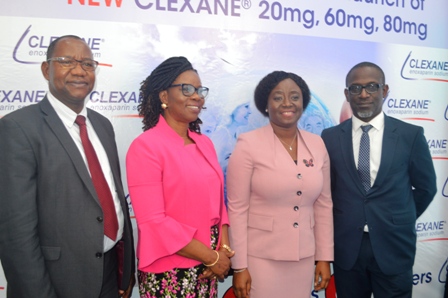In an unprecedented move to combat the growing incidence of death due to venous thromboembolism (VTE) in Nigeria, multinational pharmaceutical company, Sanofi, on Wednesday October 23, organized a scientific conference aimed at bringing Nigerian healthcare practitioners up-to-date with the management of the condition to ensure a reduction of deaths in the country.
The conference also served as a platform for the launch of Clexane (a brand of enoxaparin sodium), the company’s new drug for the management of VTE. The conference held simultaneously in six centres and was beamed digitally from Lagos to medical practitioners in Ibadan, Benin, Enugu, Kano and Abuja where participant also contributed actively.
Addressing participants, the General Manager and Country Chair Sanofi Nigeria-Ghana, Pharm. Folake Odediran said the company organised the scientific meeting while also launching the new drug to address the unmet needs in the management of thrombosis in Nigeria.
“Sanofi as a health journey partner has engaged with wide stakeholder groups to identify gaps in VTE management and how to overcome the challenges. We are providing value by focusing on driving VTE awareness, capacity building for healthcare practitioners, partnerships with health care associations and providing innovative treatment and prophylaxis options.”
Odediran decried the deadly nature of thrombosis, describing it as an important and growing health issues not only in Nigeria but globally.
“Worldwide, one in four people die from causes related to thrombosis; it claims more lives than AIDS, breast and prostate cancer and motor vehicle crashes combined. The main concern is that many people are not aware of this condition.
“VTE also has its socio-economic burden, as patients would need to spend more days in the hospital, resulting in extra treatment costs and reduction in hospital bed space available for other patients,” she added.
In her keynote presentation titled “Overview of VTE Disease Burden in Nigeria: How Hospitals Can Reduce The Risks”, a Professor of Haematology at the School of Medicine University of Benin, Prof Omolade Augustina Awodu drew attention to the importance of VTE as a medical condition worthy of attention.

From Left: Prof. Olusegun Alatishe , Professor of Surgery, Obafemi Awolowo University; Prof. Omolade Awodu, Professor of Haematology, University of Benin Pharm. Folake Odediran, General Manager/Country Chair, Sanofi Nigeria-Ghana; Prof. Mahmoud Sani, Professor of Cardiology, Bayero University, Kano; Prof. Rose Anorlu, Professor of Obstetrics and Gynecology, University of Lagos and Dr. Philip Ikeme, Head of Medical, Sanofi Nigeria-Ghana & Sub-Saharan Africa at the launch.
According to her, the condition is important because of its high rate of morbidity and mortality. Not only that, she said, the condition sometimes occurs without symptoms, unrecognised, misdiagnosed and untreated or under-treated.
“Annually, 1.5 million VTE events occur in the European Union and 900 000 in the United States. More than 500,000 deaths per year are due to complications related to VTE. Many of these are sudden and from undetected disease. Some of these events and deaths could be prevented given the availability of effective VTE prophylaxis, she said.
She disclosed that acutely ill medical patients especially, surgical cases, are the most vulnerable to VTE.
“The risk of VTE is increased by obesity, malignancy, history of VTE, immobility and hereditary or predisposition to developing thrombosis. This risk is also affected by the nature and duration of the operation, type of anesthesia, dehydration, sepsis, varicose veins and hormone therapy, she further disclosed.
Prof . Awodu advised on the need for VTE risk assessment policy for all hospitalized patients in our hospitals so that people at risk could get appropriate prophylaxis since hospitalization is linked to about 60% of Venous thromboembolism cases.
In another presentation, a cardiologist at the Bayero University Kano and Aminu Kano Teaching Hospital, Kano State, Prof. Mahmoud Sani stressed the need for patients on admission to undergo risk assessment for VTE to prevent sudden death.
“The risk of DVT in medically hospitalized patients without anticoagulation is about 10-20%,” he said, adding that “all hospitalized patients should have a risk assessment for VTE and bleeding risk upon admission.
“Risk should be documented and discussed with the patient and thromboprophylaxis offered. Patients on admission should be reassessed 24 hours after admission and every time the clinical situation changes,” Prof. Sani recommended.
A major highlight of the scientific meeting was the presentation of Clexane a new anticoagulant and brand of enoxaparin sodium by Pharm. Adeoye Sobande, Product Manager, Sanofi Nigeria-Ghana.
Drawing attention to studies showing that 70% of Hospital Associated-VTE cases are preventable through appropriate prophylaxis, Sobande told participants that “appropriate prevention of HA-VTE can result in a significant reduction in overall VTE occurrence, thereby decreasing healthcare burden and unnecessary deaths.”
The new product, he said, helps to optimize VTE management by reducing the number of injections for some patients thus offering cost effective options in patients that previously needed multiple injections.
He disclosed that Clexane has been proven to be clinically efficacious in more than 300 million patients worldwide across all indications and also comes with “clinically proven safety profile across all indications.
- SPONSORED CONTENT

